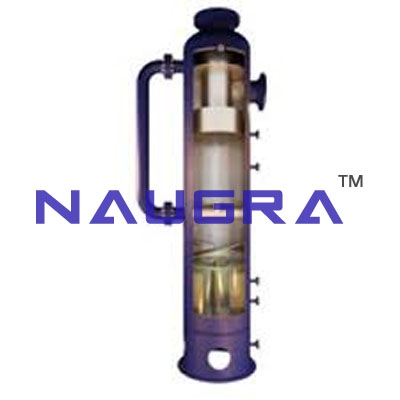- Civil Lab Mechanical Lab Engineering Lab Equipments
- sales@didacticlabequipments.com

CAT NO: DIDACTICNLE-Export-210038
Gas Cyclone- Engineering Lab Training Systems.
Technical Description
One area of application of
gas cyclones is the pre-filtration of solids from gases. Gas cyclones
have no moving parts, and so are low-maintenance systems. They can also
be used in conjunction with high gas temperatures. For these reasons
they are in widespread use.
This trainer was developed in cooperation with the Institute for Solids
Process Engineering and Particle Technology at TU Hamburg-Harburg.
A disperser is used to disperse the feed material (quartz powder
recommended) finely in an airflow. The airflow laden with solid material
(raw gas) in this way is fed tangentially into the cyclone at the top.
In the cyclone, the airflow moves downwards as a rotating primary
vortex. At the bottom of the cyclone the vortex is reversed. In the
middle of the cyclone it moves as a secondary vortex back up towards the
immersion tube, where the cleaned gas emerges from the cyclone. The
main separation process takes place in the primary vortex. Owing to the
centrifugal forces and the difference in density between the air and the
solid, the coarse solid particles move towards the wall. They slide
down the wall and are collected in a tank at the bottom of the cyclone.
No complete separation of the entire solid material takes place. The
fine particles which are smaller than the separation size are ideally
discharged from the immersion tube at the top with the secondary vortex.
This fine material is separated out of the air flow by a filter. The
separation size defines the theoretical boundary between the fine and
coarse material.
The solid content of the raw gas can be
adjusted by means of the disperser and an airflow control valve. To
prevent loading of the airflow with particles upstream of the disperser,
the drawn-in room air is filtered. An air suction fan generates the
airflow. Pressure measurement points at the relevant positions in the
trainer enable to determine the pressure loss.
For particle size analyses of the feed and the coarse material, a
balance and a screening machine are recommended.
